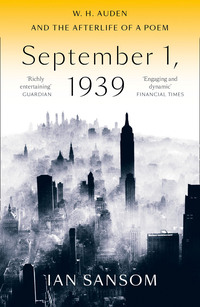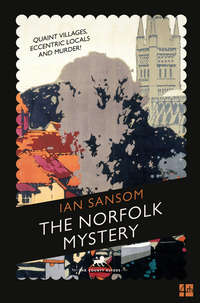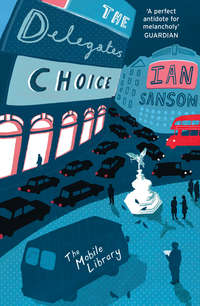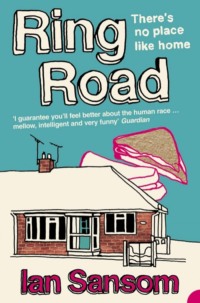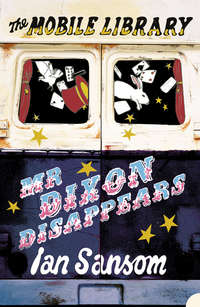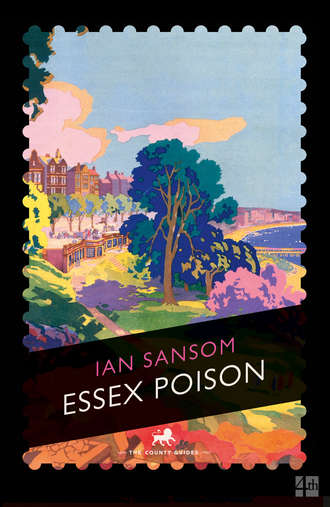
Полная версия
Essex Poison
The odds were definitely against me.
The room, like many of Delaney’s clubs, was all red plush and cheap-opulent upholstery. Gas-lit, potted palms, reproduction art in gilt frames, and with a day-bed big enough to accommodate at least three blondes. Thick-set filing cabinets sat obediently under the windows, and an inconveniently large desk boasted nothing on it but a telephone. It was a room, like Delaney, that suggested big business and low life. This was Soho and this was exactly the sort of place and the sort of carry-on that had made Delaney such a success in Soho.
‘You are a normal healthy young man, Mr Sefton, are you not?’ asked Delaney. ‘A normal red-blooded young man?’
‘Yes.’ I had the strong feeling this was going to be a trick question.
‘It must be difficult for you then, to have to be explaining yourself in the presence of our innocent young friend Grace here.’ Grace wriggled innocently in his lap.
‘Yes,’ I agreed.
‘Difficult for you both.’
‘It’s OK, Mr Delaney,’ said Grace, in a voice like Betty Boop’s.
‘Run along, Grace,’ said Delaney, and innocent young Grace got up and ran along. She glanced at me as she walked out and I thought perhaps I saw some hint of fellow feeling, but I may have been mistaken. It’s easy to misread the glance of a half-dressed, half-bored, half-drugged beautiful woman. Much of Delaney’s business was based on exactly such misunderstandings.
Delaney allowed more smoke to gather around him before he spoke.
‘Are you a religious man, Mr Sefton?’
My guess was that ‘yes’ was probably the right answer. To say ‘no’ might have led to serious problems. ‘Yes’, as always, opened up possibilities. It kept my options open.
‘Yes,’ I said.
‘Catholic or Protestant?’
I was neither, but I knew that Delaney was from Kerry and I was banking on the average Kerryman being of the Catholic persuasion.
‘Catholic,’ I said. Wise gamble.
‘Good. So. I am myself a devout Roman Catholic.’ I could feel Gleason and MacDonald behind me nodding in approval at this announcement, as if Delaney had revealed that he were in fact the Holy Father, or indeed the Son of God himself. ‘You’ll doubtless agree with me then that theft is a sin. A grievous sin.’ More grievous a sin, I was given to presume, than his own activities as the owner of illegal drinking clubs, brothels, and as a wholesaler, distributor and retailer of drugs, drink and women.
I nodded.
‘The only question then is how you might go about putting things right between us, Mr Sefton. What’s upsetting is not only that you stole from me but that you stole that which I might willingly have given.’ Or sold, he might more properly have said. As well as his clubs, Delaney controlled a large part of many of the other businesses that kept Soho so … lively. ‘Now,’ he continued, ‘we could of course go to law over the matter.’ He laughed to himself at the thought of this clearly ludicrous suggestion. Going to law with a complaint about my own modest misdemeanour would only lead to questions about his own vast empire of sin. We would not be going to law over the matter. ‘Fortunately for you I’m not a man who believes in punishment, Mr Sefton. I believe rather in making amends, in restitution. In making good.’ He took up his cigar from the ashtray and applied it delicately to his lips, producing a few more pale rings of smoke. The tip glowed like the neon signs outside. ‘I like to think of myself not so much as a businessman, more as a problem solver.’ Again, Gleason and MacDonald nodded vigorously at this generous self-assessment. ‘And the good news is, I think I have a solution to our little problem.’ I feared as much. Beware big men in fancy suits offering simple solutions: this was not, I think, one of Morley’s maxims, one of his proverbs or wise sayings, though it might have been. The closest I can find in Unconsidered Trifles (1934) is from Horace, faenum habet in cornu, longe fuge, ‘stay away from the bull, he has hay on his horns’. What can I say? Delaney had a lot of hay on his horns.
In Spain I had gone ‘absent’ once for a few days, having been unable to reconcile what was happening all around me with what I thought was going to be happening in a true people’s republic. When I was caught trying to board a ship in Barcelona I was immediately sentenced to a week’s work in the Brigade’s disciplinary battalion. No one ever mentions the disciplinary battalion: no one spoke about it then; no one speaks about it now. We were billeted separately from others and forced, unarmed and ill-equipped, out into no-man’s-land at night, to dig trenches and erect barbed-wire fences, out among the vermin and machine-gun fire, on reduced rations and subject to ridicule and abuse. There were twelve of us on the Monday. By Friday, only ten of us remained, two men having been shot dead beside me. The crack of rifle fire overhead had reduced us to crawling in the mud among the rats to go about our work. One week’s disciplinary work.
I had a pretty good idea of how men like Delaney solved problems. They got rid of them. They used their disciplinary battalions.
‘My friends here tell me that you acted bravely in Spain,’ said Delaney. I glanced round at Gleason and MacDonald, who stood staring straight ahead. Acting bravely in Spain meant killing people before they killed you. It wasn’t exactly chivalric. It was a matter of survival. ‘Brave. Educated. Intelligent. When I look at you, Sefton, what I see is not what other people might see: a common thief, a cheat, a liar, a bitter and confused young man who has lost his way and wasted every opportunity in his life.’ As a summing-up you wouldn’t necessarily have wanted it on your gravestone but it wasn’t entirely inaccurate. ‘No. No. When I look at you, Sefton, what I see is leadership potential.’ What I saw was trouble. ‘Men like you can be very useful in my line of business. So.’ Delaney quietly and leisurely cleared his throat. ‘I’d like to offer you an opportunity,’ he said. I had a bad feeling I knew what was coming: in my experience, opportunity always comes with a cost, and often at a serious inconvenience to the opportunee. ‘If you were to come and work for me, Mr Sefton, I think we’d probably be able to write off your gambling debts.’ He stroked his chin. ‘And in time I think we’d also be able to overlook the unfortunate incident concerning the theft of goods. Though it might take us a while of course to really learn to trust one another. What do you think?’
Well. That was two job offers in one evening: first from Willy Mann on behalf of Mr Klein, and now from Delaney on behalf of Delaney. I had a feeling that Delaney’s offer was going to be harder to refuse. (On this theme – let us call it the Perennial Problem of Saying No – even Morley admits to a number of difficulties and confusions. In Morley’s Tried and Tested Temptations: Thinking About God, the Devil, Sin and Salvation (1931), for example, he provides a very troubling and troubled little gloss on Matthew 4:8–9: ‘Again, the devil taketh him up into an exceeding high mountain, and sheweth him all the kingdoms of the world, and the glory of them; And saith unto him, All these things will I give thee, if thou wilt fall down and worship me.’ Writes Morley: ‘All of us will have been subject at some time to the temptation of intellectual pride. Intellectual pride is spiritually most damaging, an affliction of perhaps the most damaged among us, a sin that represents not only a defect of the will but which also betrays and betokens the deep scars of emotional wounds.’ Anyway.) Nonetheless.
‘That’s a very kind offer,’ I said. ‘But I’m afraid I’m going to have to turn you down, Mr Delaney.’
‘Oh dear,’ said Delaney. ‘Oh dear, oh dear, oh dear.’ I had the feeling he was not a man who was used to being turned down. ‘I’m not a man who is used to being turned down,’ he said.
‘It’s just, I’m currently working for someone else,’ I explained.
‘I see. And who is this … “someone else” you’re working for?’ asked Delaney. ‘Anyone I know?’
‘A writer,’ I said.
Delaney laughed – loudly, uproariously, as if I were Frank Randle on stage at the height of the summer season in Blackpool.
‘A writer? Very good. And he pays you money? Or he pays you in stationery supplies?’
He wasn’t far off.
Gleason and MacDonald sniggered beside me.
‘I work for Swanton Morley,’ I said, expecting some sort of recognition. Morley wasn’t exactly unknown. He was at the time, and had been for many years, England’s best known and best loved journalist, editor and publisher.
‘Never heard of him,’ said Delaney. ‘Boys?’
I could hear Gleason and MacDonald vigorously shake their heads.
‘Swanton Morley. He writes for the newspapers. Writes books. He’s very … popular.’ The word died on my lips.
‘Well, if you don’t mind my saying so,’ Delaney said with a grin, ‘he’s clearly not that popular, Mr Sefton, is he?’ Delaney reminded me of someone in the way he spoke – the chimpish bravado – but I couldn’t for the life of me remember who it was.
‘Maybe not,’ I agreed. ‘You’ve never read one of Morley’s books?’ Everyone had read at least one of Morley’s books.
‘I am proud to say, sir, that I have never read any book.’
‘Never?’
‘I’m sure I may have read parts of books. But the average man does not read whole books, Mr Sefton. In this day and age I think you’ll find that the average man looks elsewhere for his entertainment. Which of course is where I come in …’
‘Of course.’
‘… as an entertainment provider. And I think I probably have a pretty good understanding of what is “popular”. A much better understanding, I dare say, than either you or your “writer”.’
‘I’m sure.’
Delaney glanced over towards the flashing neon of the Windmill Theatre.
‘In my position, Mr Sefton, in my line of work, you might say that I am blessed every day with a profound insight into the workings of the average human mind.’ He rolled his cigar between forefinger and thumb, savouring it – and there it was again, that reminder of someone else, that performance, that knowing nod and wink of the king or the jester. ‘And I’m afraid it is not always a pretty sight. You work full-time for your writer?’
‘I do.’
‘And you obviously enjoy your work?’
‘Yes.’
‘Well, that’s good, that’s very good.’ Delaney rubbed a cigary finger along his protuberant bottom lip. ‘Yes, good. Because I want you to be clear, Mr Sefton, that I am offering you what is a once-in-a-lifetime opportunity to join us in what we might call the new entertainment economy.’
‘I understand that.’
‘And yet you seem to be telling me that you’re not interested, is that correct? Just so we’re clear, you understand?’
‘Yes. That’s right.’
‘You’re not interested?’
‘I’m afraid not.’
‘You’re absolutely sure now?’
I hesitated. ‘Yes.’
‘Well,’ said Delaney, sighing deeply. ‘That is unfortunate, Mr Sefton. Very unfortunate.’
‘Yes,’ I agreed. I was disappointed myself.
‘Mmm. Well, as I say, it is a shame, because if you’re really not in a position to accept the offer it would mean that you and I still have a little bit of a problem to resolve, wouldn’t it?’ He rolled the tip of his cigar around the edge of the ashtray.
And in that moment I realised who Delaney reminded me of: he reminded me of Morley. They had a different repertoire of gestures and lines, of course, but it was a repertoire of gestures and lines nonetheless, a kind of performance, a top-of-the-bill performance in both cases, a captivating performance, a performance almost entirely uninhibited by petty concerns about the audience, which is ultimately what made it a great performance, a carefree performance closely resembling and mimicking the expression of the natural self, but a performance nonetheless. I always felt that I would never know Morley, in the same way I hoped I would never really know Delaney – perhaps because they would never truly know themselves. They were actors, being themselves. Which made them both utterly unlike average people, who are too busy living their lives to be bothered much with acting – and which is of course what made both Morley and Delaney so fascinated by the average and the everyday. They were not average and everyday, neither of them, and never could be.
‘I’m afraid I am at something of a loss then, Mr Sefton. I have offered you a solution to the problem, which you have refused. Perhaps you should tell me what you think we should do?’
‘I could just pay you back,’ I said.
‘Really?’ Delaney gave a sinister little laugh. ‘Well, if I had known you were simply going to pay me back then there’d have been no need for this long discussion, would there? This rig-marole.’ He rolled the ‘r’ of the rigmarole. ‘A cheque is acceptable, but I would prefer cash. You might be so kind as to visit my cashier downstairs on the way out. I’m assuming you have the money with you now?’
‘I was wondering actually if we could arrange some sort of … payment plan?’
‘A payment plan?’
‘A schedule of repayments,’ I said.
Gleason and MacDonald sniggered again.
‘Well, I suppose it’s not an unreasonable request,’ said Delaney. Gleason and MacDonald immediately stopped sniggering. ‘How about if I give you to the end of the month to pay me in full?’
‘I was hoping actually that you might be able to extend the period of repayment a little longer,’ I said. The end of the month gave me about two weeks. I was thinking more like two years – maybe until 1939. Or 1940. By then things might have calmed down. I might have straightened myself out.
‘Longer?’ said Delaney. ‘You want longer?’ Delaney examined the tip of his cigar. ‘Oh dear. I am disappointed, Mr Sefton. You see, that just shows a lack of … ambition, don’t you think?
‘I—’
‘Also I don’t know if you’re familiar with traditional banking practices, but I’m afraid it’s really not common practice for the borrower to determine the terms of repayment. It is the lender, rather, who holds all the cards, as it were.’
‘Of course,’ I said.
‘Good. So we’re agreed then that you’ll be paying me back at the end of the month, payment in full, in cash. Plus the small matter of compensation for the stolen goods, of course; shall we say we’ll double the amount and round it up to, what, one hundred pounds?’
‘One hundred pounds?’
For me, and indeed for almost anyone except for the very wealthy and the very lucky, one hundred pounds in 1937 was an unimaginable amount. For me, working for Morley, it was almost a year’s wages.
‘That’s a deal then,’ said Delaney. ‘Gentlemen, would you show Mr Sefton the door?’
Gleason and MacDonald hauled me out of my chair and began to escort me – drag me, rather – to the door.
‘Oh, Mr Sefton, just before you go.’
Gleason and MacDonald paused and turned me around just as we had reached the top of the stairs. I could see Delaney smiling, framed in the doorway like a painting of some all-powerful potentate: hand-grained features, black-enamelled hair, ivory teeth, the very image of the inscrutable and implacable.
‘I wonder,’ he said, ‘I’d be interested to know: have you perhaps heard rumours about my methods for calling in debts? In those very very rare cases where people are not able or unwilling to make their payments?’
‘Yes, I have,’ I said.
‘Well’ – he chuckled – ‘the rumours, you will be delighted to hear, Mr Sefton, are not entirely true. Isn’t that right, boys?’ Gleason and MacDonald wholeheartedly agreed that not all the rumours were entirely true. ‘Not at all. Not at all at all at all. Just be careful going down the stairs now.’
The Windmill Theatre sign winked red at me, I stepped forward, Mickey Gleason pushed, and I began to fall.

CHAPTER 4
THE MUSIC WRITERS’ MUTUAL PUBLISHING CO.
NOTHING WAS BROKEN. That was the main thing. I was sure nothing was broken. I had managed to put out a hand to prevent myself from going head first but I had rolled and skidded and smashed my way down and was at the bottom of the stairs when I heard my Brigader friends rushing towards me. I’d curled into a foetal position to protect myself from the inevitable beating. I pressed myself into the cracked linoleum and waited for the first blow. Instead I felt a hand reach down to pull me up.
‘Sorry about this, mate, no hard feelings, eh?’ said Gleason.
‘Sure,’ I said, relieved, beginning to stand.
Which is when MacDonald took a well-aimed kick that knocked me back against the door.
‘Just pay up, you swine,’ said MacDonald, or words to that effect, with his characteristic Glaswegian charm. The rest of what he said, and exactly what he said is, alas, unrepeatable. Suffice it to say, I was left in no doubt that it would be in my best interests to pay my debt to Delaney without delay or hesitation.
When they finally pushed me out the door back onto Windmill Street – ‘See you in two weeks with your hundred pounds!’ called MacDonald with one final thump, as I staggered back – I noticed a tiny brass plaque indicating the name of Delaney’s offices, which I had never noticed before. The Rendezvous. Indeed it was.
I was breathing hard – panic and pain, a bad combination. I checked my ribs. I needed somewhere to rest. Somewhere to gather my thoughts and tend my wounds. Somewhere safe.
Some of the places I stayed in London in between assignments with Morley during our time together: Berwick Street, Dean Street, Greek Street, Wardour Street, in ‘hotels’, basements, flophouses and grand apartments, in mews, rows, streets, yards, courts, drives, circuses, both inside and out in the cold. There is nowhere, however, that I can particularly recommend: there is nowhere that remains the same. Time and money, tourism and sheer merchant greed have swallowed up the Soho that I knew and loved.
My most reliable stopover during those years, the place I dragged myself to when all seemed lost and there was nowhere else to go, was the offices of the Music Writers’ Mutual Publishing Company, on the fourth floor of 14 Denmark Street – long since disappeared but fondly remembered.
During my time at college – when I wasn’t drinking or suffering the after-effects of drinking – I had somehow become involved with the college Music Society. I was in a Gilbert and Sullivan and a couple of end-of-term concerts, and was a stalwart of the – often rather rowdy – revues, which is where I first met Ronald ‘Easy’ Pease, of the Pease family brewers of Batley. Ronald was studying music. He was a multi-instrumentalist who played the violin, the viola, the oboe, the flute, the French horn, the organ, the piano and – most proficiently and competently of all – the fool. Ron was a prankster, the sort of person who liked to enter a room and immediately set about causing mischief. He even looked like a puppy, with masses of dark unruly curls and big soulful eyes. He also had charm and money, which meant that he managed to escape rustication on a number of occasions for various incidents of drunkenness, vandalism, nudity and – after one memorable night out – for ‘fouling’ on the doorstep of the Master’s Lodge. (It probably helped that Ron’s father and grandfather had both attended the college before him and that the generously endowed Pease Building was an important addition to the college estate.)
After college, Ron had attempted for a while to pursue a conventional career as an orchestral musician, but because he was an independent-minded sort of a fellow, and because he was of considerable independent means, conventions could pretty much be disregarded and after a couple of years of professional musicianship, and a couple more of entirely reckless behaviour, he eventually settled into the unlikely profession of musical arranger and lyricist, a profession that guaranteed only an irregular income but which he supplemented by happily working as an agent for the old pawnbroker on Denmark Street who specialised in musical instruments. This brought him into contact with exactly the kind of people he most liked and admired: artists, jazz musicians, reprobates and thieves. Ron’s ‘career’ was indeed almost as precarious and unpredictable as my own, the only difference being that he could afford for a career to be precarious and unpredictable, since he was one day destined to inherit a fine house in Chelsea, a place in the country, an estate in Scotland and at least one-third of a brewery. He was utterly unreliable, incapable of taking anything even half seriously, and a very good friend, but most importantly, he was the sole proprietor of the Music Writers’ Mutual Publishing Company, and had kindly provided me with a key to his office on the fourth floor of 14 Denmark Street, which meant I had a place in Soho where I could occasionally sleep when necessity demanded.
Necessity now most definitely demanded.
It was fast approaching dawn. Denmark Street was deserted. I let myself into the building and went through the lobby towards the stairs. Ron’s lease prohibited using the office for anything but commercial purposes but if you paid your rent and didn’t cause too much trouble you could get away with almost anything. There were plenty of people in the building who were getting away with almost anything. You’d often find musicians sleeping in the lobby, and pimps, and the sort of people who come out at night and then mysteriously disappear during the day, or when their bills are due. The first floor was always the busiest: on the first floor there were a couple of rooms used by prostitutes, so there’d be people in and out – as it were – at all times. Ron used to go mad because the prostitutes would hang their underwear in the shared bathroom and make a terrible mess. (I was there in fact the night that Ron decided enough was enough and started throwing their underwear down into the street, tossing silk panties and brassieres onto passing pedestrians: you scored points if you managed to land a pair of knickers on an unsuspecting bowler. I was also there the night that Ron decided his office was too small, and since the office next door was empty we just broke right through, making a big hole in the wall: for a while we called ourselves the Hole in the Wall Gang, until we realised it wasn’t funny. The building was falling apart, even without our jolly japes. We were young, carefree and hellbent on destruction.)
The lobby was empty. Not even the girls were working. I was glad no one was around. I wasn’t in the mood for conversation. Many years later, during the course of our travels, Morley, Miriam and I had to contend with the sad case of a sweet-shop owner who had apparently fallen down her stairs and broken her neck. I had been lucky in my single-flight fall from Delaney’s office – at worst I had maybe sprained an ankle – but I was bruised all over from my little chat with MacDonald and felt like I’d been mauled by whatever creature it is who is the most proficient at mauling: some lean, mean-featured pitiless Scots sort of creature, no doubt. I dragged myself up the stairs, let myself into Ron’s office and wearily settled myself into an armchair, clearing away piles of unanswered post and musical scores. Sleep came instantly.

CHAPTER 5
A TOPOGRAPHICAL CREMESCHNITTE
I WAS WOKEN what seemed like only moments later by the sound of a piano playing and the unmistakable smoky-sweet stench of Russian tea. I wasn’t sure if I was dreaming or if Ron had arrived early at the office. Knowing Ron, this seemed highly unlikely; and sure enough, when I half opened my eyes I saw that it was in fact Morley, Morley with his moustache and his grin, Morley seated at Ron’s piano, singing and strumming a song in a minor key.


